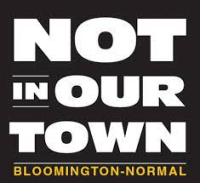Civil Rights Battles
Two civil rights battles won in local government
Former Bloomington City Hall and council chambers
109 E. Olive St., Bloomington
Location notes: If you look down the street to the east you will see a mural on the corner of a retaining wall. It is titled “Let Our Light Shine” and was a project of Not in our Town/Not in our Schools. The student artists had a common message they wanted to portray: We should all accept one another for who we are, get along, and work together to make the world a better place.
Open Housing Ordinance
Bloomington City Hall has witnessed numerous contentious debates, public hearings, and protests through the years. On July 24, 1964, after four years of effort, Bloomington passed an open housing ordinance. The NAACP had presented a proposal, the City of Bloomington and Town of Normal’s attorneys had come up with a weaker version. Speaking against the weaker version were NAACP leader Merlin Kennedy, ISU professor Carrol Cox, Reverends Jack Newsome and T.A. Clark, and high school math teacher George Warren. Alderman Walt Bittner called for a delay, but council member Frank Hartenstein moved for support of the NAACP version, saying “the time has come when we have to make a decision.” Council member Lawrence Nordine seconded and the vote was unanimously in favor. The Pantagraph reported that Merlin Kennedy had a “look of astonishment,” seeing years of effort culminate successfully. Kennedy unsuccessfully ran for city council that spring on a housing reform platform.
Human Rights Ordinance
In 1984, 1996, and 2002, Bloomington considered amending its human relations ordinance to include LGBTQ+ people. In 1984, council member Steve Simms raised the issue, but the proposal met stiff opposition from Bloomington’s alderpersons, and never went beyond council work sessions. In 1996, the ordinance was defeated 6-1, with council member Mike Matejka the only supportive vote.
Despite failing to pass the sexual orientation ordinance, members of Bloomington-Normal’s LGBTQ community had reason to believe they were making serious progress, and their efforts had garnered national attention. Jerry Pope, co-chairman of the Action Committee of the Advocacy Council for Human Rights, and Bloomington Mayor Jesse Smart both appeared on the Phil Donahue show, a popular daytime talk show.
In 2001 the sexual orientation amendment to the City of Bloomington’s discrimination ordinance was back on the agenda. However, the vote was delayed by Mayor Judy Markowitz for seven months, while she waited for a council meeting when all would be present. Finally, on October 28, 2002, the vote went before the Bloomington City Council and was approved 6-2.
Use our map feature to visit the location where civil rights battles took place!





Additional information can be found at the following links:




